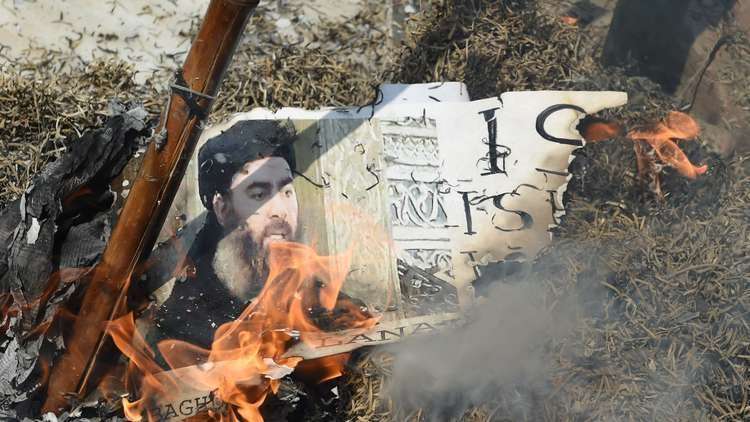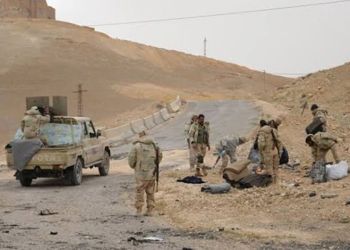This post is also available in:
![]() العربية
العربية
“Abu Muhammad Al-Hashemi”, a Daesh ideologist, claims he is close to Daesh decision-makers. He recently published a book entitled “Break Allegiance to al-Baghdadi” calling for a coup against Abu Bakr al-Baghdadi to remove him from the post of the “Caliph”.
It is believed that “al-Hashemi” is a relatives of al-Baghdadi. He has held several leadership positions in Daesh, including the Shari Judge of Mosul.
The book reflected the growing differences in the ranks of Daesh, and the state of polarization among its members due to successive military defeats, which led to their recent total defeat and loss of all territories in Syria and Iraq.
The book was reviewed and presented by two former Daesh leaders, Abu Abdul Rahman al-Mardawi, and Khabbab al-Jazrawi. They had announced breaking allegiance to Al-Baghdadi before the issuance of this book. Al-Jazrawi wrote a long letter explaining the reasons for breaking allegiance and the reasons for his coup against al-Baghdadi. He also urged Daesh members to do the same and choose someone better than al-Baghdadi to lead the organization.
The book has raised mixed reactions which reflect the intensification of the conflict within the ranks of Daesh, and the sharp divisions among Daesh’s followers. One of the first responses to the book was written by “Gharib al-Shami”. He wrote a long letter entitled “The Good Reply to the Book of Breaking Allegiance to al-Baghdadi”, accusing al-Hashemi of apostasy and hypocrisy.
In addition, “Abu Jaafar al-Iraqi” responded to the book with a letter refuting what al-Hashemi said in his book. The letter showed the extent of differences among Daesh members.
Abu Muhammad al-Hashemi said in his book that the brutality of the fundamentalist Iraqis, as he described them, their control over the Committee in Charge, and their attempt to kill all those who disagree with them, are the main reasons to call for the removal of al-Baghdadi. That will eventually result in the removal of all those fundamentalists from power. According to him, the most prominent fundamentalists in the Committee in Charge, which is the head of the organizational hierarchy in Daesh, are: Abu Muhammad Furqan, Abu Yahya al-Jamili, Abdul Nasser Karadash, Haji Abdullah Afri, Abu Zaid al-Iraqi and Abu Luqman al-Raqqi. Those people believe in the preservation of the Caliph because they believe that he is more important than maintaining the Caliphate. Al-Hashemi said that this contradicts with true Islam.
Al-Hashemi pointed out that Daesh converted to a new doctrine which did not exist in the previous Islamic movements. They became obedient to the leaders, mainly al-Baghdadi, despite the explicit violation of the teachings of Quran and Sunnah. The leaders of Daesh issued fatwas trying to convince Daesh members with their beliefs to maintain the symbolism of the Caliph.
Although this is highly controversial, it may lead to the disintegration of Daesh. It seems that the debate about it will increase, and the dispute will escalate, because of its great influence on the nature of the relationship between the commanders and the rest of the members in all the jihadist movements in the world.
Al-Hashemi focused in the book on the requirements of the man who should hold the position of the Caliph. He explained that al-Baghdadi had violated these requirements and that his disqualification has become obligatory as he is accused of injustice and discrimination among Daesh members. Al-Hashemi also urged Daesh members to oust al-Baghdadi and get rid of his injustice by saying: “Tell me what is it that you did so that this evil tyrant bin Awwad has become your master? He killed your ability to make good choices, and imprisoned righteous people. So what are you waiting for?”
Al-Hashemi relied on incidents and practices he witnessed himself, or on information he heard from “trusted” sources, some of them are leaders of Daesh. He portrayed the extent of extremism and brutality under the leadership of Baghdadi. He also resorted to Shari arguments and stories from Islamic history, highlighting the legitimate obligations to remove Baghdadi.
Finally, the book shows the extent of disagreements among Daesh leaders, and it seems that this dispute is not only a struggle for power, it is also related to ideological differences. This was the case when Daesh defected from Al Qaeda. So will this book mark a new era and further defections?
Written by: Omar Abu Layla
Deir Ezzour 24 Network, Executive Manager












